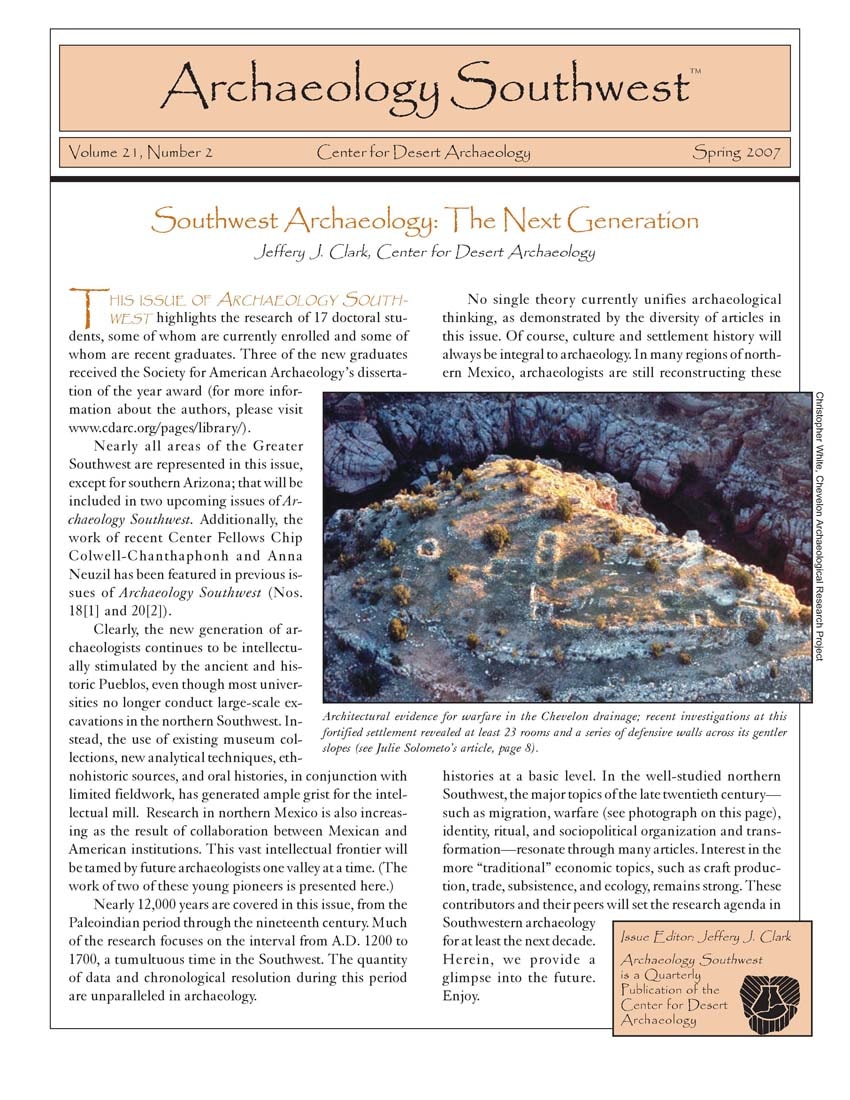Southwest Archaeology: The Next Generation
Archaeology Southwest Magazine Vol. 21, No. 2
FREE PDF DOWNLOAD

Architectural evidence for warfare in the Chevelon drainage; recent investigations at this fortified settlement revealed at least 23 rooms and a series of defensive walls across its gentler slopes.
Issue editor: Jeffery J. Clark, Archaeology Southwest (formerly the Center for Desert Archaeology)
This issue of Archaeology Southwest Magazine highlights the research of seventeen doctoral students, some of whom are currently enrolled and some of whom are recent graduates. Three of the new graduates received the Society for American Archaeology’s dissertation of the year award.
Nearly all areas of the Greater Southwest are represented in this issue. Additionally, the work of Preservation Fellows Chip Colwell-Chanthaphonh and Anna Neuzil has been featured in previous issues of Archaeology Southwest Magazine (18[1] and 20[2]).
Clearly, the new generation of archaeologists continues to be intellectually stimulated by the ancient and historic Pueblos, even though most universities no longer conduct large-scale excavations in the northern Southwest. Instead, the use of existing museum collections, new analytical techniques, ethnohistoric sources, and oral histories, in conjunction with limited fieldwork, has generated ample grist for the intellectual mill. Research in northern Mexico is also increasing as the result of collaboration between Mexican and American institutions. This vast intellectual frontier will be tamed by future archaeologists one valley at a time.
Nearly 12,000 years are covered in this issue, from the Paleoindian period through the nineteenth century. Much of the research focuses on the interval from A.D. 1200 to 1700, a tumultuous time in the Southwest. The quantity of data and chronological resolution during this period are unparalleled in archaeology.
No single theory currently unifies archaeological thinking, as demonstrated by the diversity of articles in this issue. Of course, culture and settlement history will always be integral to archaeology. In many regions of northern Mexico, archaeologists are still reconstructing these histories at a basic level. In the well-studied northern Southwest, the major topics of the late twentieth century—such as migration, warfare, identity, ritual, and sociopolitical organization and transformation—resonate through many articles. Interest in the more “traditional” economic topics, such as craft production, trade, subsistence, and ecology, remains strong. These contributors and their peers will set the research agenda in Southwestern archaeology for at least the next decade. Herein, we provide a glimpse into the future.
Articles include:
Southwest Archaeology: The Next Generation — Jeffery J. Clark, Center for Desert Archaeology
The Paleoindian Occupation of Sonora, Mexico — Guadalupe Sanchez, University of Arizona
The Sustainability of Mimbres Farming Settlements — Steve Swanson, Arizona State University
Re-evaluating the “House” in Chaco Canyon, New Mexico — Carrie C. Heitman, University of Virginia
The Northern San Juan Region, A.D. 1150–1300 — Donna Glowacki, University of Notre Dame and Crow Canyon Archaeological Center
The Prehistoric Evolution of Northern Tiwa Hierocracy — Severin Fowles, Columbia University
The Conduct and Consequences of War in Chevelon, Arizona — Julie Solometo, James Madison University
Understanding Ancestral Hopi Migration and Identity, A.D. 1275–1400 — Wesley Bernardini, University of Redlands
Ritual Zooarchaeology at Homol’ovi — Vincent M. LaMotta, University of Arizona
Prehistoric Wall Decoration in the American Southwest — Julia I. Meyers, University of Arizona
Mobility and the Transformation of Ancient Cibola Communities — Gregson Schachner, University of California, Los Angeles
Pottery and Scales of Interaction in the Pueblo IV Zuni Region of New Mexico — Deborah L. Huntley, Southwest Archaeological Consultants
Domestic Architectural Production in Northwest Mexico — Elizabeth Bagwell, Desert Archaeology, Inc.
Production, Exchange, and Social Identity: A Study of Chupadero Black-on-white Pottery — Tiffany Clark, Desert Archaeology, Inc.
Forgotten Pueblos: An Archaeological Assessment of Colonial Piro Settlement — Michael Bletzer, Southern Methodist University
The Archaeology of Jemez Resistance and Revitalization in the Pueblo Revolt Era, 1680–1696 – Matthew Liebmann, College of William and Mary
Pueblo Population Change on the Jemez Plateau, A.D. 1200–1700 — Jeremy Kulisheck, Santa Fe National Monument
The Emergence of Jicarilla Apache Enclave Economy During the Nineteenth Century in Northern New Mexico — B. Sunday Eiselt, Southern Methodist University
Back Sight — William H. Doelle, Center for Desert Archaeology
Subscribe

